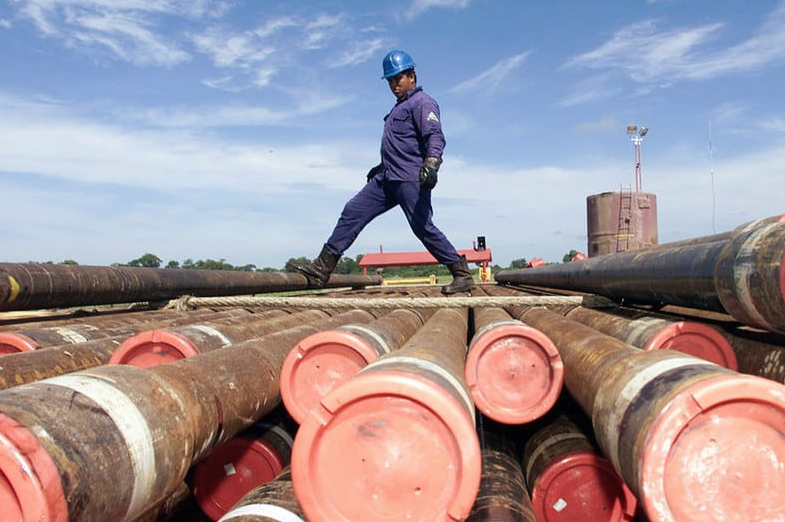Excerpts of an interview with the current president of Guyana, Irfaan Ali, were recently circulated by the BBC, in which he was questioned about the greenhouse gas (GHG) emissions that will be generated by Guyanese oil extraction and consumption over the coming decades.
The interview left in the air some incomplete ideas about the path to advance in the reduction of GHG emissions associated with the energy sector. This is because the interviewer’s questioning attempts to infer that the decarbonization of this sector is limited to a reduction in the supply of fossil fuels, when, in fact, these mitigation efforts should be part of an organized plan to gradually advance in the reduction of demand for these energy sources.
Contrary to what is expected for the energy industries, there is great uncertainty about the occurrence of a peak in oil demand until 2040. Even if it were to occur, oil will surely continue to have a significant share in the world energy matrix. In this sense, the oil that Guyana stops placing on the international market will be supplied by another producing country.
Development and climate action plans
The Guyanese case perfectly illustrates the dilemma faced by developing countries with significant oil and natural gas reserves: the need to balance development needs with climate change mitigation and adaptation plans.
Guyana is one of the poorest countries in the Americas. The conditions of the Guyanese economy before the discovery of oil in the Stabroek block showed a small country with few prospects of achieving major transformations in its productive matrix due to a serious deficit in financial resources, skilled human resources and infrastructure.
Thus, the boom in Guyanese oil extraction and export operations has opened a unique window of opportunity to boost the country’s economic and social development. This opportunity is understood, with considerable consensus, by Guyanese political elites as a source of resources to advance the country’s transformation through the implementation of economic diversification and climate action plans.
In addition to the above, Guyana has a negligible contribution to global GHG emissions. The oil produced, almost all of which is exported, in addition to being of good quality, also has an intensity of GHG emissions associated with extraction operations that is well below the world average. This makes Guyanese crude oil a competitive resource compared to other producing countries in a market where, in addition to the cost of production, consuming countries will tend to favor importing oil with lower emissions intensity.
Alternatives for a just energy transition for Guyana
Considering the above, it is important to analyze alternatives to ensure that Guyana and other countries in similar situations can meet their development objectives and contribute to containing climate change.
One alternative is for major consuming countries to coordinate planned actions to meet their energy demand by purchasing these resources from developing countries such as Guyana.
However, this option is not without its challenges. The first is associated with Guyanese capacity to adequately manage oil revenues, due to phenomena such as the curse of natural resources. In this sense, the purchase of crude oil could be accompanied by cooperation plans to support developing countries in terms of institutional strengthening. The Guyanese case already illustrates this issue, given that in recent years it has received financial and technical assistance from UNEP, the World Bank and the U.S. government in the process of implementing its oil policy and sustainable development plans.
Another aspect to consider is the risks to energy security derived from oil imports. The impact of the conflict in Ukraine on energy markets has restored the centrality of security of supply to the energy policy agenda of States. To mitigate these risks, Guyana must work on strengthening its reputation as a reliable supplier that respects and honors its commitments, in addition to avoiding aligning itself with international conflicts.
On the other hand, industrialized countries may adopt other initiatives aimed at compensating Guyana for its decision not to monetize part of its oil and gas reserves. In this way, if accepted, the new South American petrostate could also find a source of resources to finance its sustainable development plans.
The low-carbon energy transition is a process that is already irreversible. As stated in Article 2 of the Paris Agreement, the responsibility of States for its implementation is shared but differentiated. In that sense, there is no doubt that Guyana must also contribute to the containment of the climate crisis by decarbonizing its economy, preserving its natural sinks and harnessing the co-benefits of such actions to improve the quality of life of its citizens.
Nevertheless, in a world that will continue to demand oil to meet its energy needs, it seems unfair to deny the small South American country the opportunity to take a leap towards development based on the use and good management of its natural resources.
The international community has the capability to support Guyana on its path to development through an organized and just energy transition.
*Translated by Micaela Machado Rodrigues from the original in Spanish.













